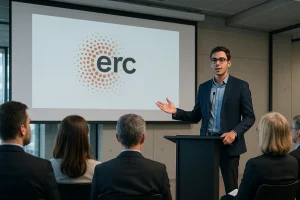
ERC Starting Grant 2026: Eligibility, Funding Amounts & Key Requirements
The ERC Starting Grant 2026 presents a valuable opportunity for early-career researchers aiming to establish independent research careers in Europe.
With significant funding, a flexible research scope, and global eligibility, it supports ambitious scientific exploration across disciplines.
This guide outlines key eligibility criteria, funding amounts, and essential application requirements for prospective applicants looking to compete in this highly selective programme under Horizon Europe.
What Is The ERC Starting Grant 2026?

The ERC Starting Grant 2026 is designed to support early-career researchers who have demonstrated the potential to become independent research leaders.
It is offered by the European Research Council under the Horizon Europe programme.
The grant enables researchers to build their own teams and conduct pioneering research across a wide range of disciplines.
In 2026, the ERC has earmarked a total of €705 million to fund an estimated 450 projects. This marks a significant investment in early-career research leadership across Europe.
The application process for the 2026 call closed on 14 October 2025, with a notable increase in submissions.
A total of 4,807 applications were received, representing a 22.4% increase from the previous year. In 2024, the increase had already been 13%, which highlights the rising demand and competitiveness for this grant.
Applications were distributed across the three ERC research domains:
- Physical Sciences and Engineering: 1,980 applications
- Social Sciences and Humanities: 1,568 applications
- Life Sciences: 1,257 applications
It is also worth noting that women submitted nearly 43% of all proposals, which is the highest percentage ever recorded in the history of the ERC Starting Grant programme.
Who Can Apply For The ERC Starting Grant 2026?
The ERC Starting Grant is intended for researchers who are at the early stages of their careers and are ready to lead their own independent research projects. To be eligible, applicants must meet specific criteria:
- Between two and seven years of experience since completing a PhD
- A scientific track record that shows great promise
- A research proposal of high scientific quality
Applicants of any nationality are welcome to apply, provided they intend to carry out their research within an eligible Host Institution located in an EU Member State or a country associated with Horizon Europe.
The Principal Investigator must show evidence of past achievements and demonstrate the ability to undertake independent research.
Publications in major journals, prior participation in advanced projects, and leadership qualities are all taken into account during the evaluation.
What Types Of Research Proposals Are Eligible?
The ERC funds research based on the bottom-up principle. This means applicants can submit proposals in any field of research.
There are no predefined thematic priorities or restrictions, which encourages freedom of scientific exploration.
Proposals are evaluated solely on the basis of excellence. This applies to both the proposed research project and the capability of the researcher.
Projects that involve high-risk and high-gain methodologies are particularly encouraged, provided they are supported by sound reasoning and methodology.
Where Must The Research Be Carried Out?

Research activities funded through the ERC Starting Grant must take place in a public or private legal entity located in an EU Member State or an associated country.
This Host Institution can be a university, research centre, or any other recognised organisation involved in research.
The Host Institution is responsible for providing the right conditions that allow the Principal Investigator to manage the research project independently.
While applicants are not required to be employed by the institution at the time of submission, there must be a formal agreement if the proposal is successful.
The key responsibilities of the Host Institution include:
- Providing access to necessary infrastructure and support services
- Enabling financial and administrative autonomy for the PI
- Supporting the recruitment of project team members
How Is The Project Team Structured?
Although the Starting Grant is awarded to an individual researcher, it does allow for the formation of a research team.
The PI is responsible for recruiting and managing the team members who will assist in executing the research project.
Team members may be of any nationality and are not required to be based in the EU or an associated country.
This provides flexibility to collaborate with international experts and institutions, enhancing the overall impact and scope of the project.
Team composition typically includes:
- Postdoctoral researchers
- PhD students
- Technical and support staff
The structure of the team should align with the specific goals of the project and be proportionate to the work proposed in the application.
How Much Funding Can You Receive?
The ERC Starting Grant offers substantial financial support to enable ambitious research over a period of up to five years.
The base amount available is €1.5 million, but additional funds may be requested under specific circumstances.
The funding structure is outlined below:
| Funding Type | Maximum Amount | Purpose |
| Standard Grant | €1.5 million | To support direct research costs over five years |
| Additional Funding | €1 million | To cover major equipment, fieldwork, or large infrastructure costs |
| Relocation Allowance (Non-EU PIs) | €2 million | For PIs moving from non-associated countries to the EU or associated countries |
The grant can cover up to 100% of the eligible direct costs. In addition, a flat-rate contribution of 25% is provided to cover indirect costs such as administration and facility usage.
To receive additional funding, applicants must justify the necessity of the extra costs in their proposal. Examples of eligible additional costs include:
- Start-up equipment
- Access to large-scale research facilities
- Extensive fieldwork in remote locations
How Do You Apply For The ERC Starting Grant?

Applications for the ERC Starting Grant must be submitted in response to a published Call for Proposals. These calls are released annually and are published in several official platforms including:
- The ERC website
- The EU Funding & Tenders Portal
- The Official Journal of the European Union
Each application must be complete and submitted by the stated deadline. The application package includes:
- Administrative forms
- The scientific proposal
- Supplementary documents such as letters of support and ethical declarations
Applicants are encouraged to begin preparing their submissions well in advance. Late or incomplete proposals are not considered under any circumstances.
How Does The Evaluation And Ethics Review Process Work?
The evaluation of proposals is conducted through a peer-review process involving international experts selected for their scientific reputation and expertise. The evaluation is based solely on scientific excellence, which covers both:
- The quality of the research proposal
- The track record and potential of the Principal Investigator
All proposals undergo a two-step evaluation process. In the first step, reviewers assess the synopsis of the research and the CV of the applicant.
In the second step, selected proposals are reviewed in full and may require interviews with the applicant.
If a proposal is selected for funding, it must then pass an ethics review. This ensures that the research complies with EU law and international ethical standards. The ethical review examines the following elements:
- Ethics Issues Table (EIT)
- Ethics Self-Assessment (ESA)
- Any potential impact on human rights or safety
A comprehensive ESA helps facilitate this process by outlining how ethical concerns will be managed during the project.
Where Can You Find Data On Funded ERC Projects?
For researchers and institutions looking to understand past ERC funding trends, two platforms provide extensive data and visualisation tools.
ERC Dashboard
This is a user-friendly platform that enables users to explore funding data by various filters such as country, year, research domain, and funding scheme. It allows users to export results and create graphical analyses.
ERC Research Information System (ERIS)
ERIS provides more advanced search functions and data analytics capabilities. Features include:
- Text mining to identify trends
- Dynamic visualisation tools including word clouds and clustering
- Bibliometric data and project outputs
- Exportable tables and charts
These tools are particularly useful for applicants who want to benchmark their proposals or align their research with previously funded projects.
What Are The Key Facts From The 2026 ERC Starting Grant Call?
The 2026 ERC Starting Grant call presented several important trends and statistics. These highlight both the scale of participation and the evolving landscape of research funding in Europe.
| Key Metrics | Value |
| Total Applications Received | 4,807 |
| Year-On-Year Increase | 22.4% |
| Physical Sciences Applications | 1,980 (41%) |
| Social Sciences Applications | 1,568 (33%) |
| Life Sciences Applications | 1,257 (26%) |
| Proposals Submitted by Women | 43% |
| Total Budget Allocated | €705 million |
| Expected Grants Awarded | 450 |
| Funding Announcement Timeline | Summer 2026 |
These numbers reflect a high level of interest and a growing recognition of the ERC as a prestigious funding body.
The increase in female applicants also points to positive trends in gender representation in research leadership.
What Should You Know Before Submitting A Proposal?

Applicants should take several preparatory steps to strengthen their chances of success. Understanding the requirements and evaluation criteria is only the beginning.
It is equally important to:
- Allocate sufficient time for drafting and reviewing the proposal
- Address all ethical considerations in detail
- Clearly define the project’s objectives and expected impact
- Justify the budget with realistic and necessary expenses
Avoiding common pitfalls, such as unclear methodologies or overambitious timelines, can make a significant difference in the final evaluation.
Engaging with mentors, peer reviewers, or institutional support offices can also improve the quality of the submission.
Conclusion
The ERC Starting Grant 2026 offers a unique path for emerging research leaders to develop pioneering projects with substantial support.
Understanding the eligibility rules, funding structure, and evaluation process is vital for building a competitive proposal.
With increased submissions and strong backing from the ERC, early preparation and strategic planning are essential for success in this highly competitive funding scheme.
Frequently Asked Questions
What is the success rate for ERC Starting Grant applications?
The success rate varies annually. For 2026, with 4,807 applications and 450 grants expected, the projected success rate is around 9-10%.
Can I apply if I received my PhD more than 7 years ago?
Only applicants within 2–7 years of completing their PhD are eligible, although certain career breaks (e.g., maternity leave) may allow for exceptions.
Is a host institution outside the EU or associated countries acceptable?
No. The host institution must be located in an EU Member State or a country associated with Horizon Europe.
What disciplines are most successful in securing ERC grants?
All disciplines are eligible, but application volume and success rates vary. Physical Sciences often see a higher number of submissions.
How long does the evaluation process take?
From submission to funding announcement, the evaluation typically takes 6–9 months. For 2026, decisions are expected by summer.
Can my team include non-European researchers?
Yes. The PI can hire team members of any nationality, and they may work from non-European countries if justified.
What are common reasons for proposal rejection?
Lack of originality, unclear methodology, insufficient track record, or poorly defined objectives are common causes for rejection.





